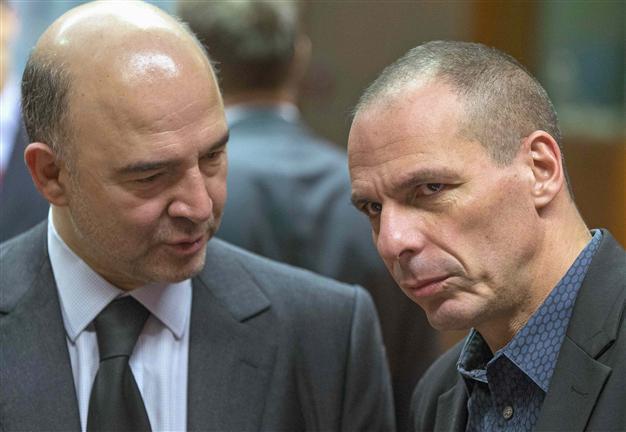Greece allows lenders back into Athens
ATHENS - Agence France-Presse

European Economic and Financial Affairs Commissioner Pierre Moscovici (L) talks with Greek Finance Minister Yanis Varoufakis (R) during an European Union finance ministers meeting in Brussels March 10, 2015. REUTERS Photo.
Greece's creditors returned to Athens on March 12 for the first time since the hard-left Syriza party came to power, with the radical new government denying it had allowed back the hated "troika" it had vowed to shun.
Athens -- which has been scrabbling for cash to meet its next major debt repayments -- insisted it had not been strong-armed into submission.
It said the technical experts sent by the creditors were merely junior officials and should not to be compared with the 'troika' team of auditors that Syriza had accused of storming into ministries like colonial "invaders".
Finance Minister Yanis Varoufakis described the officials as a "fact-finding mission" that would gather data to assist the main thrust of talks between Greece and its creditors -- the European Union, the European Central Bank and the International Monetary Fund -- which took place in Brussels on Wednesday.
He said the officials would not visit ministries but would remain in their hotels, and the relevant documents could be delivered to them there.
Athens has insisted on dismantling the previous system of EU-IMF-ECB fiscal audits, conducted by a team of experts from the three institutions known as the 'troika'.
Varoufakis also said the experts, who will help draw up a new economic plan for the troubled eurozone nation, will report to the new Brussels Group, which is made up of the old troika plus the European Stability Mechanism.
A finance ministry source had earlier told AFP that the experts would first gather fiscal data, and that discussions on structural reforms and banks would be held next week.
This marks the first visit by technical teams representing Greece's creditors to Athens since talks were suspended in December after new elections were called.
The breakthrough came after six weeks of difficult discussions -- and sometimes ugly rhetoric -- between the EU-IMF-ECB creditors and the radical new Greek government that came to power in January with the promise to tear up the country's austerity-driven bailout.
The Syriza-led government's aggressive stance quickly alienated Greece's creditors, who want the new regime to respect the terms of the 240-billion-euro ($255-billion) bailout signed by its predecessors.
With many promised reforms still incomplete, and the new government freezing a number of key privatisation projects, Athens has received no money from the remaining bailout funds, and the state is now desperate for cash.
This month alone, Greece must find some 6.0 billion euros to meet its debts -- including 1.5 billion euros to the IMF.
Some relief came on Thursday, when the ECB raised the level of its emergency loan assistance to Greek banks by 600 million euros to 69.4 billion euros.
The ECB in past weeks has repeatedly raised the bar by small sums which are insufficient to meet Athens' midterm loan needs.
Varoufakis however has insisted that Greece would be able to pay.
He said the creditors and Greece "have taken measures" and would come to an agreement to address what he called "a relatively small cashflow problem."
On Wednesday, Athens raised 1.3 billion euros in a new issue of three-month treasury bills, but had to pay a higher interest rate of 2.7 percent.
Reports on Wednesday said the government was also turning to its pension and agricultural assistance funds for emergency cash to pay public sector salaries.
On Monday, Eurogroup chief Jeroen Dijsselbloem blamed Greece for wasting precious time.
"We have spent two weeks discussing who meets who, where and in what format, and it's a complete waste of time," said Dijsselbloem, who is also Dutch finance minister.
Athens is arguing that the austerity programme that has plunged tens of thousands of families into poverty should be relaxed, a demand opposed by Germany and other eurozone creditor nations.
In turn, Greece this week ramped up pressure on Germany to compensate victims of Nazi wartime atrocities and repay a forced war loan.
"A debt must be a debt and a debt everywhere... especially those which are weighed down by historical significance," Varoufakis said in a France24 interview.
"Unless of course, we all decide that debts can be forgiven and can be restructured," he added.
Berlin argues that the issue of reparations to Greece has already been settled in 1960 as part of an agreement with several European governments.
In a move rarely seen before the Syriza radicals came to power, Athens also officially complained to Berlin over Finance Minister Wolfgang Schaeuble making disparaging remarks about Varoufakis.
Schaeuble had expressed amazement earlier this week about Varoufakis' "naive" belief that he could expect clemency from international media covering the Greek crisis.
In a new search for allies, Prime Minister Alexis Tsipras on Thursday is meeting with OECD secretary-general Angel Gurria in Paris, followed by European Commission chief Jean-Claude Juncker and European Parliament president Martin Schulz in Brussels on Friday.
